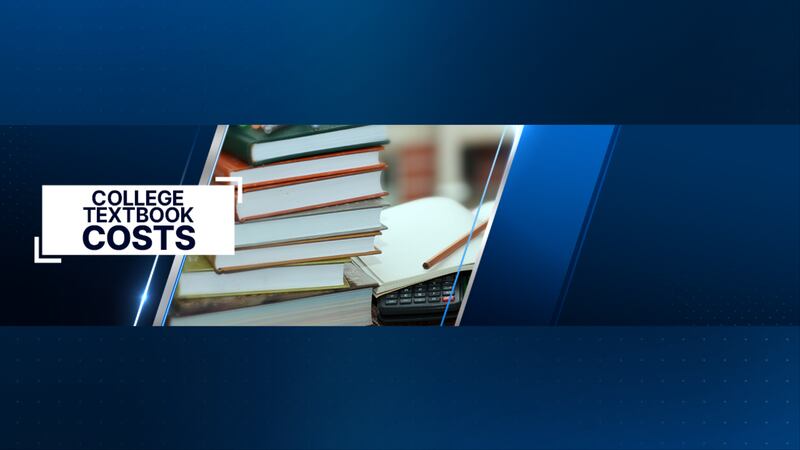WASHINGTON, D.C. — Textbooks can set college students back hundreds or even thousands of dollars. Now some universities are turning to digital course material to try to lower those prices.
But some students have mixed reviews about this effort.
▶ WATCH CHANNEL 9 EYEWITNESS NEWS
“I was kind of confused why I was getting that extra charge. I budget for my tuition, and I wasn’t expecting that,” said Sydney Greenway, senior at the University of Pittsburgh.
That was Sydney Greenway’s reaction when she was automatically charged for textbooks as part of her tuition and fees. She was enrolled in an “Inclusive Access” program.
It’s an agreement between publishers and universities to negotiate lower prices for digital course material which is automatically added the onto students’ tuition and fees each semester.
Read: Machete fight: Man riding tricycle on beach gets into fight with another man over flashlight
But a new consumer report from U.S. PIRG Education Fund reveals some of these programs may be doing the opposite.
“It’s totally inconclusive, whether students are getting savings at all, and you know, you can promise that you’re saving students money, but promises are not receipts, and we want the receipts,” said Dan Xie, political director with Student PIRGs
Researchers evaluated nearly 200 contracts between publishers, bookstores, and universities. Xie said they found some contracts require high participation quotas in order for schools to receive discounted prices which may discourage them from promoting less expensive options like used books or rentals.
Greenway said students also have limited access to the content they buy.
“For example, if it was a Physics I class, and I wanted to re-reference it for a Physics II class, I wouldn’t have been able to do that because it was an access code. I would have lost access to it that last day of class,” said Greenway.
Read: WikiLeaks founder Julian Assange reaches plea deal with US
Xie said there’s also being a rise in open textbooks which is a free option for students
“These are textbooks that professors can write and copy under open copyright. And open copyright means that any other professor in the country, you can choose the book and assign it to their students, and they can access it online totally for free,” said Xie.
But the National Association of College Stores’ (NACS) argues automatic textbook billing plans are saving students money. According to Student Watch™, the research arm of the organization, these programs have led to a 57% drop in student spending for course material over the last decade.
In a statement, the organization said, “when colleges have the economies of scale to negotiate bulk discounts on required course materials and textbooks, students win.”
Additionally, some research shows improved academic outcomes for students in these programs too.
Read: Orlando could crack down on drivers speeding through school zone
“We’re seeing course completion rates 15 and a half percent higher for students who stay in the program, opposed the opposite, opting out,” said Mike Moore, affiliate research assistant professor at the University of New Hampshire.
Moore reviewed test results from universities nationwide as part of this research. He said enrollment in these textbook programs helped minority students at even higher rates.
“Students who identify as Black in the whole campus model of those who opted out only 39% were completing the course, compared to 60 when they stayed in, so these programs in providing access, are helping our students be more successful,” said Moore.
The Department of Education is considering a proposal that would require universities to get students to sign off on the costs before adding them to their tuition and fees.
Statement from the National Association of College Stores:
“This is a proven premise: when colleges have the economies of scale to negotiate bulk discounts on required course materials and textbooks, students win. Since the Obama-Biden administration approved regulations to promote affordable access programs with strong consumer protections in 2016, student spending on course materials has dropped by 57% and students have improved day one access to materials they are required to have.” “First time student satisfaction with the programs in 2023-2024, according to Student Watch was at 59% versus only a 13% dissatisfaction rate.”
“During negotiated rulemaking, the proposed rule was widely opposed. Even student and veteran negotiators expressed concern will reduce timely access for students to required materials and also would weaken the ability of institutions to negotiate lower prices by removing a requirement that books and supplies costs be below competitive market rates. Further, many students will see higher sales taxes and loss of valuable federal tax credits as a result of the PIRG proposal.”
“Colleges and universities, as well as NACS, are actively engaging the Biden Administration and the Department of Education to offer insight into the efficacy of Inclusive Access programs, including individual cost savings and positive impact on student academic outcomes, and we look forward to helping to inform a final rule that will not undermine the savings students rely on and continue to safeguard student protections and access.”
Statement from Association of American Publishers
The “report” in question is rife with bogus claims about “findings” based on data they admit they do not actually have access to. As such it is designed to distract from the real facts.
The actual data on higher education is unanimous in its conclusion that the course material programs known as Inclusive and Equitable Access – which were created under Obama-era rules -- have driven a dramatic decline in student spending in the category, with NACS’ Student Watch citing a drop of 57% over the last ten years; independent research firm Student Monitor citing a similar decline of 45%, and the College Board reporting annual student spending of just $310 dollars a year on course materials (see page 11), making the category a rare bright spot in higher education affordability.
Legitimate scholarship has also made it clear that these programs offer immense benefit to underserved populations, with research by Dr. Michael Moore of the University of New Hampshire demonstrating that Inclusive Access significantly increased success rates, with students who identify as Black seeing improvements by as much as 13%. In the first ever study on Equitable Access, Dr. Moore’s data demonstrated that students who participated in the model had an average course completion rate 15.58% higher than those who opted out, with the number climbing as high as a 22% completion rate increase for some student groups.
The public outcry over the Department of Education’s proposal to eliminate the rules that make these remarkable programs possible speaks for itself, with students from across the country, joining professors, college administrators, and researchers calling on the department to leave the existing rules in place.
▶ WATCH CHANNEL 9 EYEWITNESS NEWS
Read:
Read:
Read:
Click here to download our free news, weather and smart TV apps. And click here to stream Channel 9 Eyewitness News live.
©2024 Cox Media Group






